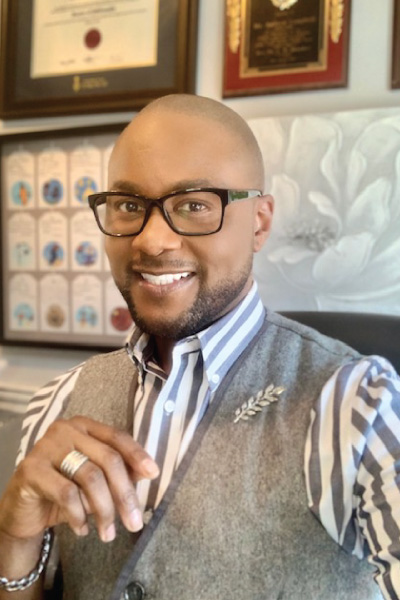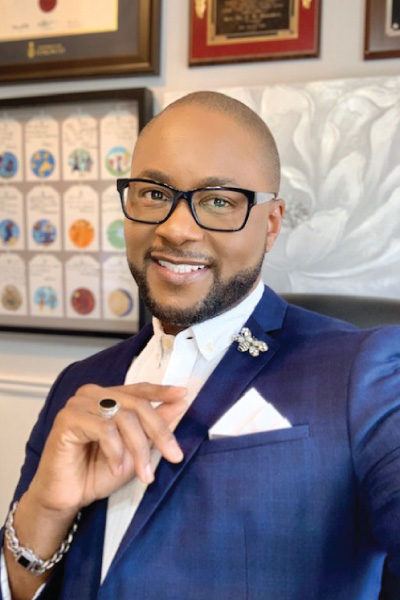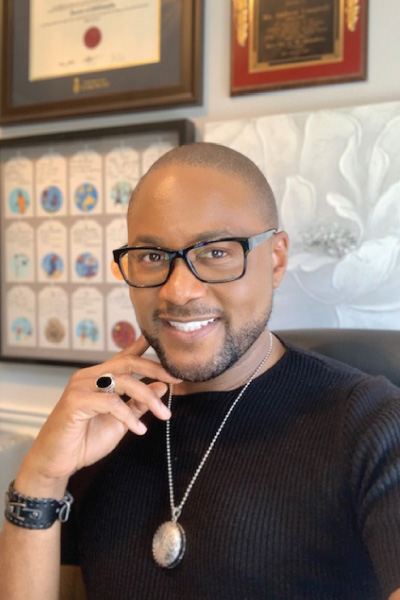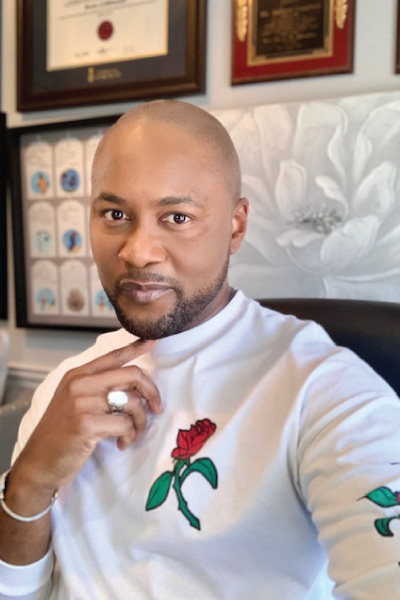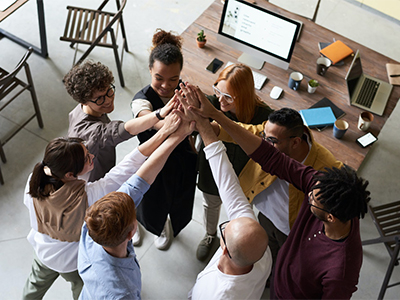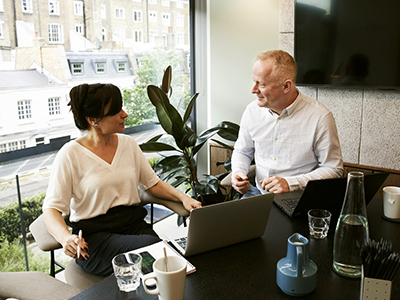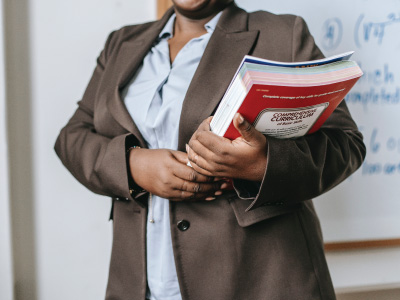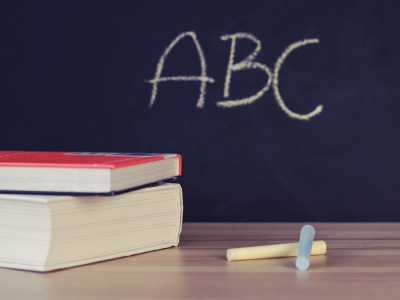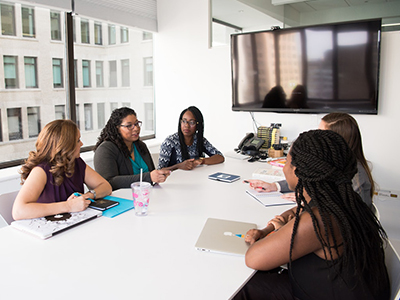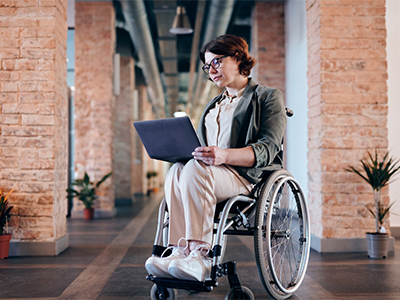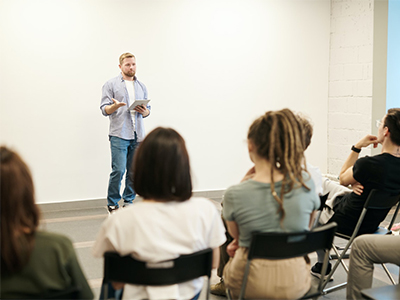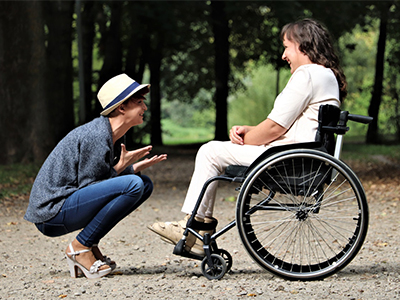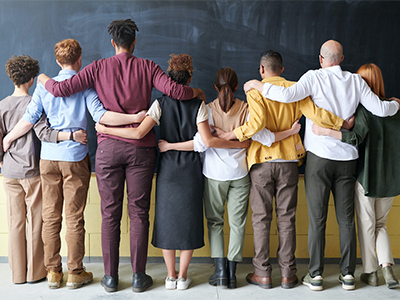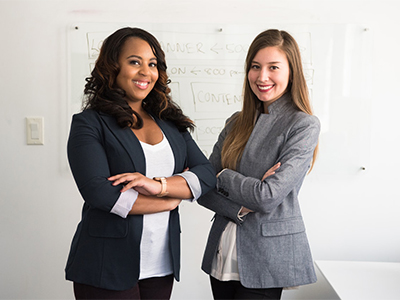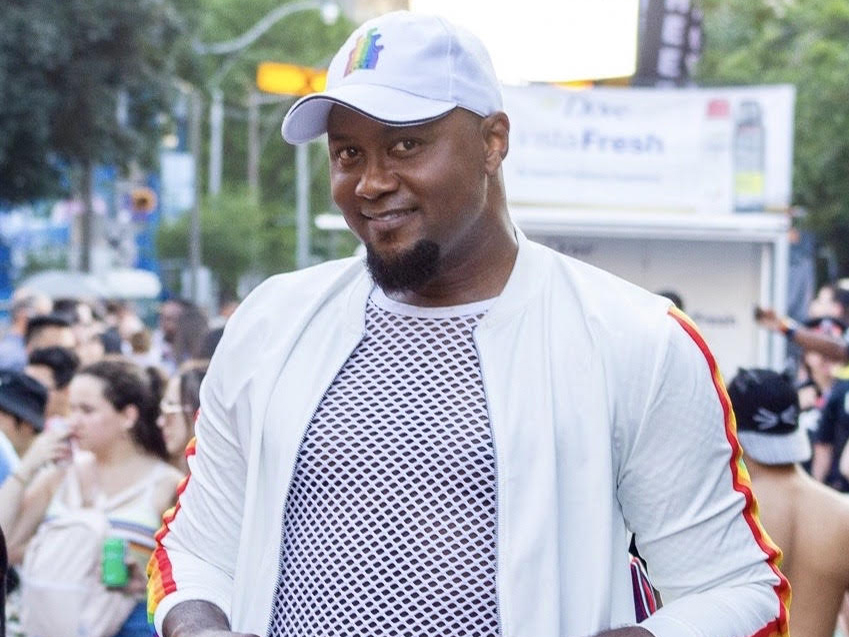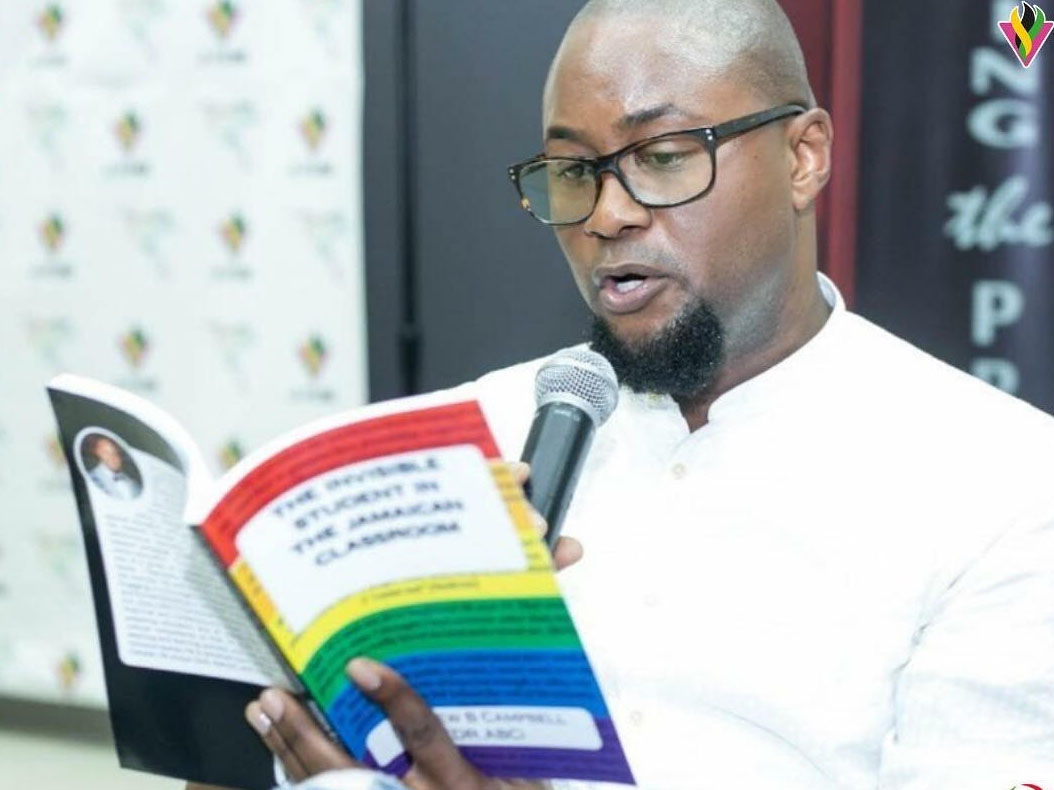dr.abc
workshops
DIVERSITY
The inclusion of different types of people (such as people of different races or cultures) in a group or organization.
INCLUSION
The act or practice of including and accommodating people who have historically been excluded.
EQUITY
Justice according to natural law or right specifically: freedom from bias or favoritism.
LEADERSHIP
The act or an instance of leading; capacity to lead: the office or position of a leader.
EQUITY, DIVERSITY & INCLUSION
Please note that all presentations can be adapted to suit your organization /institution needs
Introduction to Equity, Diversity & Inclusion
Through this introductory engagement, participants will articulate the various dimensions of differences in their personal and professional environment. They will be introduced to various concepts of equity, diversity, and inclusion. Participants will be encouraged to: engage in courageous conversations about these issues within schools/workplace; discuss ways to ensure that individual bias, prejudice, and assumptions do not impact their education/work environment and learn tools for creating an inclusive and supportive learning/work environment.
The following concepts and ideas will be included:
- Examine self (personal bias, power, privilege, beliefs, etc.)
- Dimensions of difference – Diversity Awareness
- Deficit mentality/Unconscious bias
- Stereotypes vs. representation
- Equity vs. equality
- Cultural Competence Continuum
Diversity & Leadership
Through this engagement, participants will articulate the various dimensions of differences in their personal and professional community. The session will foster a deeper understanding of the issues of equity, diversity and inclusion; and the impact of policies, and everyday practice in a diverse environment. Special focus will be placed on individual mindset, disposition and practices, and the skills needed to courageously examine your role, and work as a diversity leader(s).
Fostering Belonging in Schools
“Belonging is a manifestation of deep connection.” (Biss, 2019). What are the barriers in our schools that impact belonging? How do we ensure our school’s culture and climate is one where our students feel a genuine sense of belonging? What are those inclusionary practices that can ensure we create that culture and climate of belonging within our schools? In this workshop we will examine these questions and provide additional tools to create a deeper sense of inclusion and belonging in our schools so that students can truly see themselves reflected in what we offer to them as both education and schooling.
Disrupting Anti-Black Racism from Within
“Advocacy often has no manual. It is more about being brave and standing between the vulnerable and power. It is a brave space. It is an exposed space.” (DR.ABC, June 17, 2020).
Doing the work advocacy within your organization is often challenging as you are personally situated closer to the issues and closer to the systems of oppression. This workshop will engage participants to examine the urgency with which change must happen within systems, institutions and organizations to dismantle Anti-Black Racism (ABR), inequities, discriminations, and denials. The workshop is divided into five main themes:
– Understanding SELF and ROLES in Advocacy
– Why Dismantle?
– Tools of engaging in Courageous Conversations
– Examining Culture and Climate | Changing the Story
– Leadership, Intention and Impact
– Advocacy leadership – Change Makers.
PRESENTATION OVERVIEWS
Please note that all presentations can be adapted to suit your organization /institution needs
Introduction to Anti-Black Racism
This workshop will provide participants with a foundational knowledge of the Anti-Black Racism (ABR) looking at history, definitions, and the context in the global sphere, and more specifics based on their particular organization. The impact of ABR within systematic and instructional structures will also examine. Participants will engage in discussions, activities, and case studies to foster an increased understanding of how to recognize ABR. Through reflective and reflexive opportunities, participants will examine their personal journey and location in the discourse of ABR. The session ends with identifying and committing to strategies for challenging ABR.
From Awareness to Action: Using the Tools you have to dismantle Racism/Anti-Black Racism
Feeling helpless, hopeless and inadequate is a familiar feeling that many of us in positions of power, privilege and influence will use as a protection shield from doing the actual work of dismantling racism/anti black racism. In this workshop, we examine the many tools we already have and how to use those tools in our various roles to bring about change within our organization and the wider community.
What can I do to bring about change?
How do I move from awareness to action?
What is my role in the work of equity and inclusion?
How can I use my power and position to create change within my organization and the wider community?
How do I identity, developed and use new tools?
Growing in Cultural Competence
Developing cultural competence is a process rather than an end point. Just like any skill, the process of development and improvement continues, and it is hard to point to a particular time when one can say “That’s it! I’ve reached it!” There are many ways by which we can increase our capacity to be effective in our interactions with others. In this engagement, participants will be encouraged to use reflective and reflexive lens as a means of unpacking power and privilege and acknowledging the impact of this privilege and power in their work environment. Participants will engage with cross cultural knowledge and learn skills on how to become change agents that advocate for, with, and on behalf of clients, staff or students. As cultural humility is an important facet of professional identity that encourages self-evolvement and evolvement of self through one’s professional life, participants will have the opportunity to examine how their actions, if located at the lower levels of the cultural competency continuum, perpetuate a continuous cycle of oppression. While those actions and intentions focused at the higher level of the continuum will create opportunities for Equity, Inclusion, Access and Liberation.
The Culturally Relevant and Responsive Educator: Preparation, Planning, Pedagogy, and Practice
Culturally Relevant and Response Pedagogy (CRRP), in recent times, has been the go-to approach to ensure equity diversity and inclusion (EDI) is evidenced within the curriculum.
However, in far too many schools, what we see is an add-on here or there where “appropriate” to satisfy often a mandated approach to EDI within the Classroom. CRRP is more than an add-on; it speaks to\ the very disposition of the educator, their planning, preparation and everyday practice. In this workshop, participants will examine the tenets of culturally relevant and responsive pedagogy and decide on practical ways to center the ideas of equity and belonging within their teaching and learning engagement.
#SELFCARE and Anti-Black Racism Work
Presenting Title: “A little more oil in my lamp”: #SELFCARE and Anti-Black Racism Work
The work in Equity, Diversity and Inclusion and especially that of Anti-Black Racism is heavy lifting. It demands not just the ability to engage an audience often at various levels of openness, acceptance, and lived experiences, but often an audience filled with the
dominant voice, white gaze, misinformation, and scrutiny. Your work, worth and wisdom is on display, but more so by nature of your identity as Black, Indigenous Persons of Colour (BIPOC) or Other Minorotized Groups (OMGs) you are on display. For many BIPOC-OMGs leaders, employees, this adds to the stress of the work and impacts us in various ways consciously and often unconsciously. In this workshop we examine the need the need to bring our whole selves to this work and how to ensure we care of that self while doing this work.
Disrupting Deficit Thinking in Schools
There is a persistence of low expectation and deficit mentality that is evidenced in many classrooms. These deficit ideologies, attitude, and practices not only impacts student identify and sense of belonging but influence how educators engage with them in the school. It affects what they are offered and the opportunities they are afforded. The face of Ontario the classrooms have changed in many parts, but many educators are still lagging beyond in their quest to be truly inclusive. Many laments they do not have the tools, some have the tools but refused to engage in inclusivity practices and pedagogy, and others continue to demonstrate an attitude of bias and prejudice that place them at the lower end of the cultural competence continuum. This presentation seeks to challenge educational leaders to engage in authentic reflection, that allows them to examine who they are, unpack their power and privilege, articulate how they should be using that power and privilege to disrupt and dismantle the increasing deficit mentality that is seen in so many of our schools. Weiner (2006) notes that as educators we must examine deficit explanation critically, which will then illuminate possibilities and strategies that will focus on students strengths.
Equity, Diversity, & Inclusion in the Workplace
Ortega and Faller (2011) described a cultural humility perspective as one that encourages workers to take into account an individual’s multiple identities and the ways in which their social experiences impact their worldview, particularly as it related to their expression of their culture. In this workshop, participants will have the opportunity to articulate the various dimensions of differences found in their personal and professional community; and evaluate personal biases and prejudices that have impacted their worldview and understanding of others. Participants will develop a clear understanding of current terminologies associated with the Equity, Diversity and Inclusion, such as power, class, privilege, bias, systemic oppression, individual and structural racism. In order to create inclusive and equitable work environments, participant will unpack stereotypes and unconscious bias that impact the health and well-being of staff. More importantly, they will develop a personal action plan to acquire the skills, knowledge, and dispositions necessary to move progressively towards cultural proficiency.
More than a Potluck: Gaining Cultural Competence in the Workplace
Cultural competence builds on your profession’s ethics and values relative to self-determination and individual dignity and worth and embraces the practices of inclusion, tolerance, cultural humility, and respect for culture and diversity. Using a reflective and reflexive lens and a process of learning and unlearning, participants will engage in courageous conversations to: develop the skills necessary to effectively interact and engage in individual and system growth towards cultural competence; know the importance of raising and including diverse cultural viewpoints; and acquire skills that can help adjust to new cultural environments or welcome those that are new to your workplace. Further, participants will have the opportunity to examine how actions at the lower levels of the continuum perpetuate a continuous cycle of oppression, while those actions and intentions focused at the higher level of the continuum create opportunities for Equity, Inclusion, Access and Liberation.
Uncovering & Dealing with Unconscious Bias
Many of us have a false sense of self-perception in terms of how we think we assess others. How can we ensure that our assessment of others is done in fairness and with accuracy? In this session there will be a discussion on the many ways that unconscious bias occurs almost automatically – how it is engrained in our way of speaking, doing, and being. Participants will explore and examine how your identities and exposure to cultural and social attitudes about such things as age, gender, race, ethnicity, religion and social class can impact the way you engage people within the world. Participants will learn the ways in which biases affect our existing and potential relationships and apply tools to mitigate the effects and prevention of bias in our personal interactions with others.
Presentation Skills 101|How to prepare for and present in public with confidence
Whether we’re talking in a team meeting or presenting in front of an audience, we all have to speak in public from time to time. Through this engagement, participants will examine the art of public speaking and presentations in order to become a confident, compelling speaker. The workshop utilizes three main strategies on how to prepare, practice and present in the public. Some of the key concepts and ideas that will be included are: the value of researching the topic(s) beforehand; use of technology; time management; examining personal and professional styles; building confidence; and dressing for your presentation. This session concludes with a discussion on the value of evaluation, and personal reflection as effective tools for continuous growth and development.
Identifying and Amplifying Your Leadership Skills
For many people who are in leadership roles they’re told to be authentic leaders but never told what that means in the work environment. This workshop provides an overview of some of the key theories of leadership and their impact on leaders’ behaviours and leadership styles. Participants will: reflect on your personal leadership style, get deliberate around how they show up in the role and create a plan to make lasting change in a multiracial working environment. With the use of case studies materials, participants will be provided with essential strategies they can employ to amplify their leadership styles/skills and best practices.
Building and Sustaining, Professional and Intentional Relationships
Relationships are the often the source of our greatest joys and greatest challenges. Understanding how to engage any type of relationship is no simple task and there is no easy formula. This presentation will outline the difference between personal and professional relationships. Participants will be guided through strategies and techniques to create successful conscious, and intentional relationships. Good working professional and personal relationships mature over time, therefore ability to respect and appreciate differences that exist within them will, in turn, win you respect and appreciation from others.
The presentation will also provide participants with relevant examples and best practices on the ways in which they can enhance, build and sustain their professional relationships. Participants will discuss the intricacies of communication, understand the power of relationship building and how to develop mutually beneficial relationships. Further, they will be provided with several essential networking tips in order to enhance their professional relationships with colleagues and leaders in their organization.
The Changing Face of Your Classrooms: Being intentional about Equity, Diversity and Inclusion
Difference, however, we might define it, is good. It makes us who we are and makes the world wonderful. In the education environment, both students and school staff must understand that, and strive for a more inclusive world that values difference, practices empathy, and extinguishes oppressive forces like racism, sexism, homophobia, ableism, and beyond. This talk provides a general overview of the changing face of Ontario’s classroom and the need for increased cultural competence for all stakeholders. We will also examine the need for engaging in courageous conversations as a community around issues of equity, diversity and inclusion that have historically affected racial minority students and continue to impact our school community. Finally, we will examine some intentional and actionable steps we can begin to take as individuals to contribute to a more inclusive community.
Becoming a Champion for Equity, Diversity and Inclusion
Inclusion, equity, and diversity brings with them many intersecting challenges, uncertainty, and grey areas. Each term adds a different and unique dimension to understanding the relations of power at work. In order to unpack this, we need to know how to work together to build an inclusive culture in the workplace. How do we get to be an “active participant” in the philosophy and practice of equity, diversity and inclusion in the workplace? Can we bring others on board? Do we know how to implement the change we need? This workshop takes you on an inspiring and informative journey towards becoming Diversity Champions.
By sharing and drawing on your own reflections, participants will be guided through a discovery of their own individual and collective strengths. Participants will understand how they can use their voice to be more effective actors for transformational change.
This workshop will also discuss approaches that can be used to have courageous conversations that are needed. Finally, utilizing the best practices that will be discussed and shared, participants will determine where they are in their Equity, Diversity and Inclusion journey.
Leave today knowing that you are championing for equitable practices and change! And more importantly, be prepared to take your colleagues with you on your champion’s journey!
Black LGBTQ: Living on the Edges
This workshop will focus on the realities and lived experience of Black LGBTQ youths as
they navigate the spaces not created for them, ultimately pushing them to the edges. Areas
of emphasis include:
– Black LGBTQ Youths and Identity
– Black LGBTQ Youth and Mental Health
– Black LGBTQ Youths and Sexual (Mis)Education
– Black LGBTQ Youths Forming Friendships and Healthy Relationships
The workshop will draw on the work of Dr. Andrew Campbell’s book, The Invisible student
in the Jamaican Classroom. Participants will have the opportunity to examine the responses
of other LGBTQ youths that exist in the similar spaces and, through reflection, provide their
reactions to some of the difficult questions they face based on their specific identities and
intersectionality. The session will conclude with practical ideas and resources for
participants to continue to live and thrive within brave spaces that have been created for
them and those they will create for themselves.
Breaking the Silence – 2SLGBTQ+ Visibility
On May 17, 2020 we observed the International Day Against Homophobia, Transphobia &
Biphobia. The focus was on breaking the silence – examining the many ways we must tell
our stories, claim space, establish our voices, and ensure we are heard. This presentation
will draw attention to the continued resistance needed in your organization where
2SLGBTQ+ may remain “invisible” due to a myriad of reasons. In this workshop we
examine the ways we must work at ensuring 2SLGBTQ+ members are seen and heard.
Black 2SLGBTQ+: Making Space in the Workplace
In this presentation I examine the intersection of race and sexuality. Both streams affect the
lives of marginalized people on a regular basis. Connecting with either of these identities,
let alone both, can lead to obstacles and barriers in accessing services. By bringing
awareness to the issues that 2SLGBTQ+ Black communities face, we will educate services
providers so they in turn may guide their clientele to be the informed experts.
By sharing and drawing on your own reflections, participants will be guided through a discovery of their own individual and collective strengths. Participants will understand how they can use their voice to be more effective actors for transformational change.
This workshop will also discuss approaches that can be used to have courageous conversations that are needed. Finally, utilizing the best practices that will be discussed and shared, participants will determine where they are in their Equity, Diversity and Inclusion journey.
Leave today knowing that you are championing for equitable practices and change! And more importantly, be prepared to take your colleagues with you on your champion’s journey!
OTHER WORKSHOPS AVAILABLE
- Developing Your Leadership Styles
- Leadership and Advocacy
- Change Management: Dealing with Change
- Coaching and Mentoring
- “I SEE YOU”: The Inclusive Workplace
- Lesson Planning for Effective Student Engagement
- The Instructor’s Role in Student Learning
- Stepping away from Transactional Leadership: Engaging in Transformational and/or Transformative Leadership
- Dismantling Deficit Mentality Through Critical Relevant and Responsive Pedagogy

